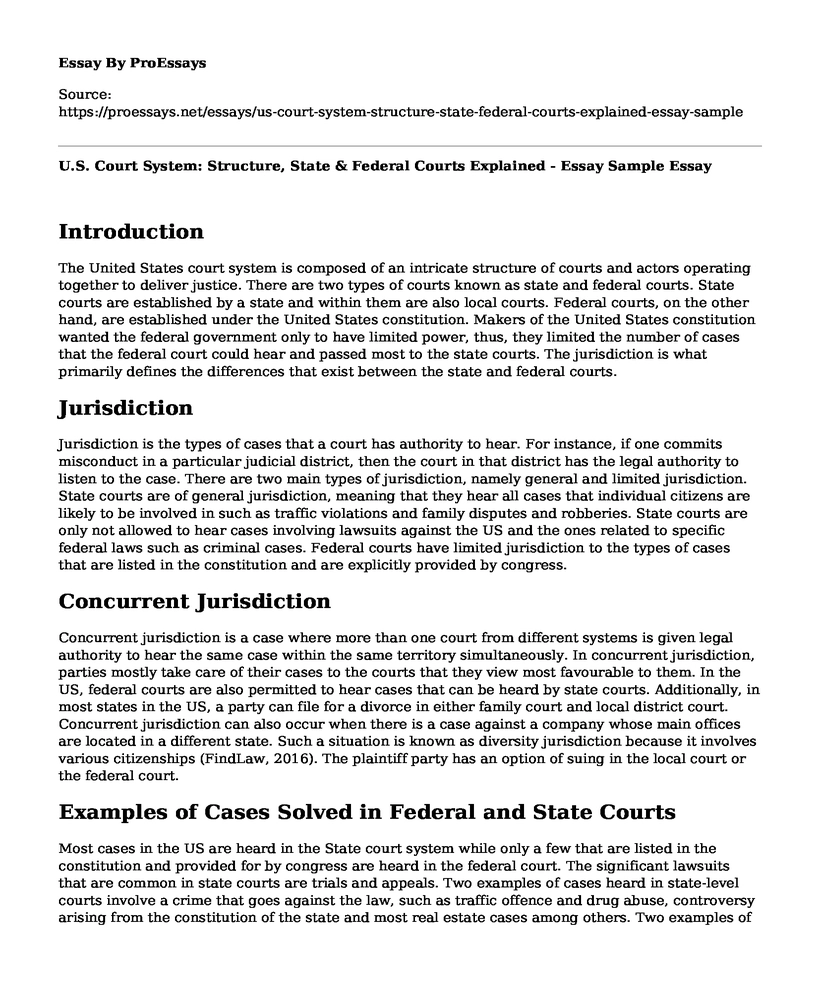Introduction
The United States court system is composed of an intricate structure of courts and actors operating together to deliver justice. There are two types of courts known as state and federal courts. State courts are established by a state and within them are also local courts. Federal courts, on the other hand, are established under the United States constitution. Makers of the United States constitution wanted the federal government only to have limited power, thus, they limited the number of cases that the federal court could hear and passed most to the state courts. The jurisdiction is what primarily defines the differences that exist between the state and federal courts.
Jurisdiction
Jurisdiction is the types of cases that a court has authority to hear. For instance, if one commits misconduct in a particular judicial district, then the court in that district has the legal authority to listen to the case. There are two main types of jurisdiction, namely general and limited jurisdiction. State courts are of general jurisdiction, meaning that they hear all cases that individual citizens are likely to be involved in such as traffic violations and family disputes and robberies. State courts are only not allowed to hear cases involving lawsuits against the US and the ones related to specific federal laws such as criminal cases. Federal courts have limited jurisdiction to the types of cases that are listed in the constitution and are explicitly provided by congress.
Concurrent Jurisdiction
Concurrent jurisdiction is a case where more than one court from different systems is given legal authority to hear the same case within the same territory simultaneously. In concurrent jurisdiction, parties mostly take care of their cases to the courts that they view most favourable to them. In the US, federal courts are also permitted to hear cases that can be heard by state courts. Additionally, in most states in the US, a party can file for a divorce in either family court and local district court. Concurrent jurisdiction can also occur when there is a case against a company whose main offices are located in a different state. Such a situation is known as diversity jurisdiction because it involves various citizenships (FindLaw, 2016). The plaintiff party has an option of suing in the local court or the federal court.
Examples of Cases Solved in Federal and State Courts
Most cases in the US are heard in the State court system while only a few that are listed in the constitution and provided for by congress are heard in the federal court. The significant lawsuits that are common in state courts are trials and appeals. Two examples of cases heard in state-level courts involve a crime that goes against the law, such as traffic offence and drug abuse, controversy arising from the constitution of the state and most real estate cases among others. Two examples of cases heard in the federal court are crimes that are a violation of the federal law such as bank robbery and kidnapping and crimes involving controversies between two states. State courts handle most cases because they are more in contact with the public than the federal court. Federal courts hear few constitutionally related cases because they are of national importance and the rights protected extend to everyone in the country.
Example of a Case of Concurrent Jurisdiction
An example of a case of concurrent jurisdiction is when a party from a different state such as Georgia sues one from another country such as Florida over a contact breach- the Georgia party can either sue in federal court under diversity jurisdiction of in the state court in Florida under the personal jurisdiction of the defendant. Another instance where concurrent jurisdiction may be created is where the US congress in creating a course of action gives legal authority to the courts of the states to hear cases alleging that course of action. For example, a state court can hear an allegation of infringement of trademarks under the Lanham act.
The federal courts in the USA include The United States Supreme Court, the U.S Court of Appeals and the United States District Courts. The state courts vary with different states. In Missouri state, there is Missouri Supreme court, Missouri Courts of Appeal and Missouri Circuit Courts. State courts files about 30 million cases annually, while the federal court files approximately one million annually (FindLaw, 2016).
Conclusion
In conclusion, the United States Constitution is the highest law that creates a federal government system in which authority is shared between federal and state governments. As a result, each of the governments has its own courts. The state and federal courts differ in structures, judicial selection and the types of cases that they hear. The major lawsuits that are common in state courts are trials and appeals. Federal courts are important because they defend most basic rights of citizens, such as equal protection. United States state courts are also crucial because the state government passes most laws affecting the ordinary citizen.
References
FindLaw. (2016, April 4). Federal Vs. State Courts - Key Differences. Findlaw. https://litigation.findlaw.com/legal-system/federal-vs-state-courts-key-differences.html
Cite this page
U.S. Court System: Structure, State & Federal Courts Explained - Essay Sample. (2023, Apr 05). Retrieved from https://proessays.net/essays/us-court-system-structure-state-federal-courts-explained-essay-sample
If you are the original author of this essay and no longer wish to have it published on the ProEssays website, please click below to request its removal:
- Should Parents Be Held Responsible for the Crimes of Their Children? - Essay Sample
- Essay Sample on Improvements to the Correctional Systems
- Essay Sample on Gender and Crime
- Essay Sample on Criminal Law: Rules, Punishments and Defenses
- Essay Example on America's Judge Marilyn Milian: A 41-Minute Courtroom Drama
- Organized Crime: Criminal Organizations, Terrorist Groups, and Militias - Essay Sample
- Essay Example on Essential Human Right: Access to Clean Water & Sanitation







